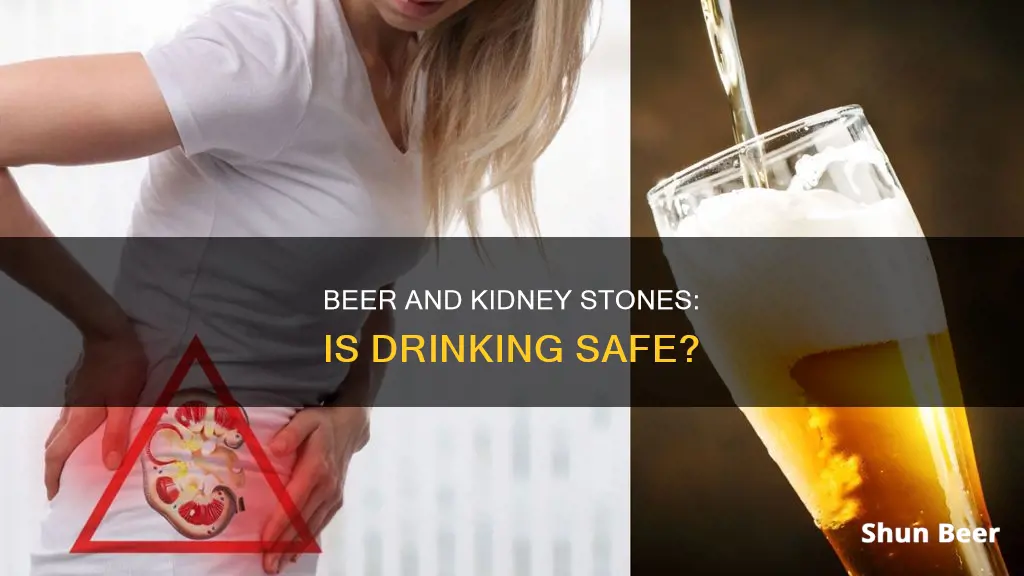
Alcohol is associated with myriad negative effects, and while chronic and heavy use should be avoided, a handful of medical conditions are falsely associated with alcohol consumption. One such condition is kidney stones. Drinking alcohol does not directly lead to kidney stones, although it is associated with various health problems that are risk factors for kidney stone formation, such as diabetes, obesity, and kidney injury, fibrosis, and inflammation.
However, it is important to note that alcohol has diuretic properties, which can lead to dehydration, especially when consumed in excess. Dehydration can interfere with the functioning of the kidneys and other organs, and frequent urination can lead to further dehydration, putting one at greater risk of developing kidney stones.
While there is no direct link between alcohol consumption and kidney stones, moderation is always key when it comes to alcohol intake to maintain overall health and well-being.
| Characteristics | Values |
|---|---|
| Can alcohol cause kidney stones? | No, drinking alcohol doesn't directly lead to kidney stones. |
| What causes kidney stones? | High levels of calcium, oxalate, and phosphorous in urine. |
| What are the symptoms of kidney stones? | Constant need to urinate, cloudy or foul-smelling urine, sharp pains in the groin, lower abdomen, back, and/or side, pain while urinating, inability to urinate or limited ability to pass urine. |
| Can alcohol worsen kidney stones? | Yes, alcohol-induced dehydration can cause kidney stones to move quickly and increase kidney pain. |
| How to prevent kidney stones? | Drink enough water, eat more calcium-rich plant foods, watch the sodium intake, cut back on animal protein. |
What You'll Learn

Alcohol does not cause kidney stones
Kidney stones are hard, pebble-like deposits that form in the kidneys. They are typically caused by high levels of calcium, oxalate, and phosphorous in urine. Drinking alcohol does not directly lead to kidney stones, although it is associated with various health problems that are risk factors for kidney stone formation, such as diabetes, obesity, and kidney injury, fibrosis, and inflammation. However, there is no strong correlation between kidney stones and alcohol consumption.
It is important to note that alcohol has diuretic properties, which can lead to dehydration, especially when consumed in excess. Dehydration can interfere with the functioning of the kidneys and other organs. Additionally, alcohol affects the kidneys' ability to maintain the correct balance of water and electrolytes in the body, which can increase the risk of developing kidney stones.
While alcohol itself does not cause kidney stones, drinking excessive amounts of alcohol can lead to health conditions that increase the risk of stone formation. Therefore, it is crucial to drink in moderation and prioritize hydration, especially when consuming alcohol.
Drinking Beer in Penn Station: What's Allowed?
You may want to see also

Beer may help prevent kidney stones
Beer drinkers (consuming one can between once a week and once a day) showed a 41% reduction in kidney stones. This was even higher than wine drinkers, who showed a 31% to 33% reduction. It is important to note that these quantities are much smaller than the amount of water recommended for kidney stone prevention.
While beer may help reduce the risk of kidney stones, it is important to remember that excessive alcohol consumption can have negative health consequences and increase the risk of other health conditions. Therefore, it is always advisable to drink in moderation and consult with a healthcare professional to determine the appropriate amount of alcohol consumption based on individual health status.
Additionally, staying hydrated by drinking enough water is crucial for kidney stone prevention. A meta-analysis from the National Kidney Foundation found that individuals who produced 2 to 2.5 litres of urine daily were 50% less likely to develop kidney stones. This amounts to consuming about 8 to 10 8-ounce glasses of water daily.
In conclusion, while beer may offer some protection against kidney stone formation, it should be consumed in moderation as part of a balanced and healthy lifestyle that includes adequate water intake to effectively reduce the risk of kidney stones.
Pouring Beer: Catfish Bait or Urban Myth?
You may want to see also

Alcohol-induced dehydration may cause kidney stones
The kidneys are essential to keeping the body healthy and free of harmful substances such as alcohol. They filter and rid the body of waste through urine. The kidneys also maintain the proper balance of fluid and electrolytes. When your kidneys have to work extra hard to rid the body of excess alcohol, you may experience pain. Frequent urination that goes along with this flushing of the system can lead to dehydration, which can, in turn, cause kidney stones.
Drinking alcohol if you already have kidney stones may cause them to move quickly, which can contribute to and increase kidney pain. Alcohol-induced dehydration can also cause existing kidney stones to move around, leading to pain and other complications.
To prevent alcohol-induced dehydration and reduce the risk of kidney stones, it is important to stay hydrated by drinking plenty of water. It is also recommended to limit alcohol consumption and avoid drinking in excess.
Ethanol Distillation Simplified: Beer Stripper Method
You may want to see also

Drinking water can help prevent kidney stones
While drinking beer is not directly linked to kidney stones, alcohol consumption can increase the risk of developing them. Alcohol is a diuretic, which leads to dehydration, especially when consumed in excess. Dehydration can cause kidney stones as it affects the kidneys' ability to maintain the correct balance of water and electrolytes in the body. Therefore, it is important to drink plenty of water to stay hydrated and reduce the risk of kidney stone formation.
Drinking water is an effective way to prevent kidney stones. Water helps to dilute the substances that form kidney stones, such as calcium, oxalate, and uric acid. The National Kidney Foundation found that individuals who produced 2 to 2.5 litres of urine daily were 50% less likely to develop kidney stones. This amount of urine production typically requires consuming about 2 litres of water per day.
In addition to drinking enough water, there are other strategies to prevent kidney stones. Eating more calcium-rich plant foods, such as yogurt, soy products, beans, lentils, and seeds, can help reduce the risk of stone formation. Citrate, a salt found in citric acid, can also help prevent stones by binding to calcium. Drinking lemon juice or consuming citric fruits can increase urine citrate levels and reduce the risk of kidney stones.
Watching your sodium intake is another important factor in kidney stone prevention. A high-sodium diet increases the amount of calcium in the urine, which can trigger the formation of kidney stones. It is recommended to limit daily sodium intake to 2,300 milligrams.
Finally, reducing animal protein intake can also lower the risk of kidney stones. Eating large amounts of meat, eggs, and seafood can increase the risk of stone formation. If you are prone to kidney stones, it is advisable to limit your daily meat intake to the size of a deck of playing cards.
In summary, while drinking beer may not directly cause kidney stones, alcohol consumption can increase the risk by causing dehydration and affecting kidney function. To prevent kidney stones, it is crucial to stay hydrated by drinking enough water and incorporating other preventive strategies, such as a balanced diet and adequate fluid intake.
BeerSmith Compatibility: Apple Devices and Beyond
You may want to see also

Drinking too much alcohol can lead to gastritis
Drinking alcohol is not a direct cause of kidney stones. However, alcohol is associated with various health problems that are risk factors for kidney stone formation, such as diabetes, obesity, and kidney injury, fibrosis, and inflammation. Therefore, while there is no strong correlation between kidney stones and alcohol consumption, drinking excessively can increase your risk of developing kidney stones.
Drinking too much alcohol can have serious negative consequences for your health. One potential issue is the development of gastritis, which is the inflammation of the stomach lining. While there is no clear association between alcohol consumption and peptic ulcers, excessive drinking can lead to acute erosive gastropathy, where the stomach lining develops ulcers, erosions, and bleeding. Alcohol-involved gastritis is also strongly associated with active H. pylori infections.
Drinking heavily can also cause inflammation in the pancreas, known as pancreatitis. This occurs when alcohol causes the pancreas to produce toxic substances. Pancreatitis can become a long-term condition and lead to serious complications. It can cause abdominal pain, impair the pancreas' ability to produce enzymes and hormones for proper digestion, and even result in dangerous internal bleeding.
In addition to these gastrointestinal issues, excessive alcohol consumption can have a range of other harmful effects on the body. It can cause cardiac issues such as high blood pressure, liver problems including fatty liver and cirrhosis, and a weakened immune system. Alcohol interferes with the brain's communication pathways, affecting mood, behaviour, and coordination. It can also increase the risk of several types of cancer, including head and neck cancer, esophageal cancer, and breast cancer.
To reduce the risk of these health issues, it is important to drink in moderation. According to current guidelines from the Centers for Disease Control and Prevention (CDC), moderate drinking is defined as one or fewer drinks per day for women and two or fewer drinks per day for men.
Mixing Beer and Adderall: What You Need to Know
You may want to see also







